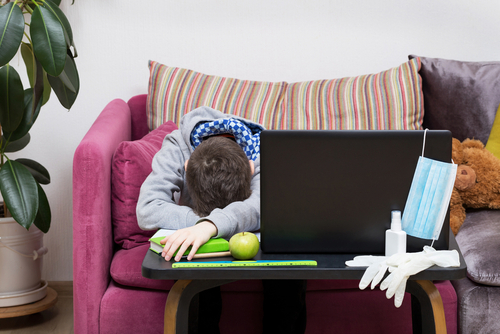Getting the right amount of quality and quantity of sleep is especially important for children. Sleep is needed for brain development and growth. It is vital for concentration levels at school, as well as temperament and emotional health. It’s now well known that children who don’t get the right amount of sleep are more likely to gain weight, have a lower resistance to illness and disease. By setting up good sleep habits from the earliest possible age, we are setting up our child for life.
Top Ten tips.
1) One rule for all
Children learn by example, copying both siblings and their parents. Having the same ‘fair’ set rules for everyone with regards to boundaries on use of technology both inside and outside the bedroom makes it easier to set up good habits and healthy routines. For example, if you have a problem with teenagers and siblings using their phone in the bedroom past an agreed curfew then set the example by keeping your phone outside of the bedroom overnight too. It removes the temptation for everyone to use them too late and makes it easier to enforce the ‘fair boundary’
2) Have a bedtime routine
Quality sleep and getting to sleep easily is all about routine. This includes aiming at the same bedtime every evening. The first step is to avoid stimulation close to bedtime. Switch off computers, computer games and TVs etc. at least one hour before bed. Instead have a bath, do something relaxing such as reading a book together. Younger children would have a routine such as teatime, bath, read story and then bed. However, even if you follow this routine don’t expect your child to go straight to sleep it should take about 10 to 20 minutes to nod off.
3) Keep blue light put of the bedroom overnight
Blue light is emitted from computer and phone screens and is the wavelength of light which is designed to wake us up. If you stare into a screen at night this stops the production of Melatonin the sleep hormone . Using night time modes and flux ( blue light filter) help eliminate this , but best still is to not have easy access to these screens in the bedroom overnight.
4) Get the food right
Children often complain about being either too full or too hungry to get to sleep. Don’t allow your child to eat large meals close to bed time. However, a light snack of fruit such as a banana or a milky drink can help with hunger or quench a thirst. Sometimes a glass of water next to the bed at night can also be useful, as children often feel thirsty at night. Above all avoid caffeine after lunch and especially at night, this includes all chocolate, which has caffeine in it.
5) Make your child’s bedroom sleep friendly
Create the right environment in the bedroom by having it set up for good sleep, which is dark, quiet and cool. A good quality bed and mattress is essential, as it will support your child’s body in the right places as they sleep. The correct temperature for a bedroom is usually a little cooler than you think (a lowering body temperature indicates to the body that it is night-time). However, have extra blankets on hand in case your child gets cold in the night.
Black out blinds are another useful component of a child’s bedroom, which help keep the room both cool and dark in the summer. Bedrooms also need to be clear, tidy and free from clutter to minimise distractions (the bedtime battle is hard enough without calls for playtime!). Choose a simple but efficient storage system that fits your needs, so clean ups are quick and painless.
6) Educate your child about the importance of sleep and make it teamwork
It’s easier to do something if you understand the reasons behind it, so educating children about the value of sleep is a good place to start. Younger children can benefit from a picture chart rather than a discussion, showing images of a good bedtime routine.
7) Do a count down and avoid ‘Just one more’
For younger children a countdown to bedtime is a great way of getting a young child into bed on time. 30 minutes to go, 15 minutes, then 5 will line up the deadline a lot easier than a last minute ‘its time for bed’. Also try to include anything that your child asks for as ‘one more’ when they are in bed. If it’s one more cuddle, a story or glass of water that’s asked for work it into the pre-bedtime routine, so you’ve pre-empted their ability to ask for one more once they are in bed. That way all avenues are exhausted before bed, so your child will know that once in bed it is exclusively sleep time.
8) Bright and early
Our bodies are designed to recognise sunshine as time to get-up-and-go, so help your children wake up more naturally with a bit of sun in the morning. Open the curtains first thing to get sunlight into the bedroom and boosting the body’s production of cortisol the wake up hormone.
9) Get their hearts pumping
Exercise boosts serotonin production in our bodies, which then is turned into melatonin, the sleep hormone. Getting your children to exercise more in the day will reduce the time it takes for them to get to sleep and will increase the total time they sleep. Make sure all exercise is finished around two hours before bed, to allow time to settle down.
10) Praise them
Keep giving them feedback about how they are doing and always look to praise your children about how well they are doing. Positive reinforcement from their parents will lock in good sleep habits in your children for life. You could not be giving them a better legacy.









